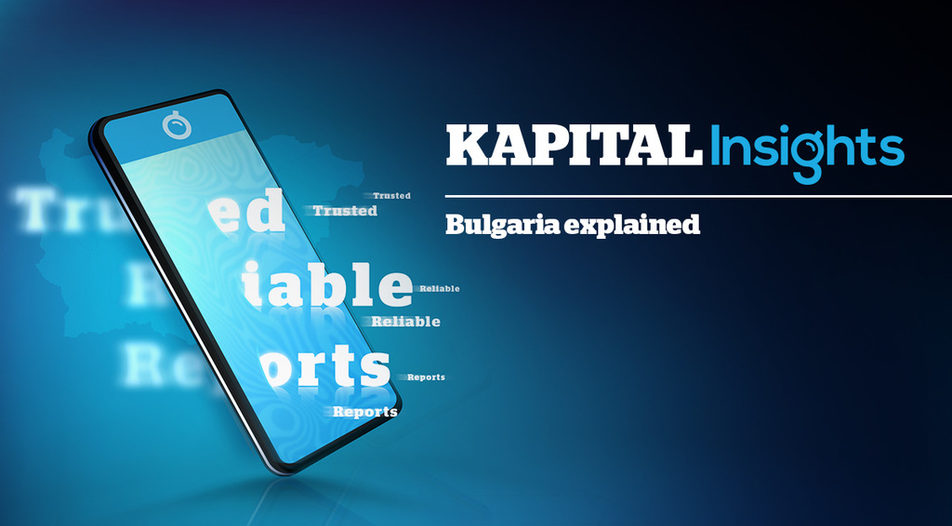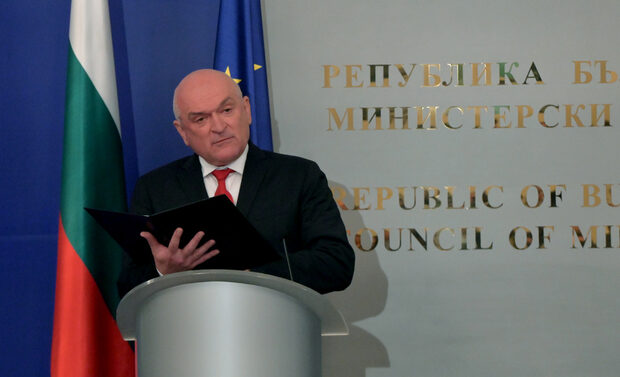Welcome to the first of (hopefully) many K Insights weekly newsletters. K Insights is part of Kapital: the most respected news brand in Bulgaria for over two decades. Those of you who had access to our exclusive English-language service KQ know the quality we offer.
Kapital Insights is the proud, digital heir of KQ - ready to accept more friends and be with you every week.
This will be a service unlike any other on offer from Bulgaria at the moment. It will strive to give you a concise and smart overview of the last seven days here - from politics and economy to business and people.
It will not cover everything, but it will make sure you know all that's important. And most of all, it will do it in style and with a wink. The best way to imagine it would be to liken it to a know-it-all friend whom you meet once a week to catch up with the rumor mill in Sofia.
The newsletter will be out every Friday and is available on mail, mobile, or on the website kinsights.capital.bg
POLITCS THIS WEEK
And pandemics. Of course
This year, as well as the last, politics is pandemic and vice versa. So let's start our review of the week with the latest news about what you can and can't do in Bulgaria. First of all, from this week you can't enter the country without a PCR test. That is new - until recently Bulgaria was a laggard in the EU and wasn't imposing any restrictions on entry. Since the numbers improved dramatically (it is in the lowest 5 in the EU in terms of new COVID-19 cases), Sofia now wants to keep it that way. You can read all the details here.
Sofia: still a gateway to the US
Curiously, Bulgaria, together with Romania, remain the only EU countries without a ban on entering the US. This oversight, originating with the first Donald Trump order last year that banned all Schengen countries, was confirmed this week yet again with a new State Department ruling. So if you want to travel across the Atlantic, passing through Sofia en route to Istanbul for example, is still a good way to avoid quarantine.
Gyms and malls - yes, restaurants - no
The remarkable happened: there was a protest and the government didn't back down! Although hundreds of workers in the hospitality sector and owners of restaurants and bars gathered on Wednesday to protest the indefinite closure of their sector, the restrictions will remain in place (as well as the health minister whose resignation they demanded). The tentative date for opening them is 1 March. While this is probably reasonable from a health point of view, the fact that many of them are still waiting for any support from the government, a full 2 months after closure, is shameful.
Gyms and malls, on the other hand, were allowed to open, so you can now train freely and save money (and calories) by eating at home. But you have to be careful: only facemasks will be allowed from 1 February (this means no scarfs, plastic helmets, putting a plastic bag or your hand over your mouth, etc.)
Also - elections.
In case you don't know, Bulgaria is gearing up for elections in April. There will be a lot to discuss later on (look out for our piece on the elections next week), but here is some news from this week: the latest poll shows 5 parties are going to make it to the next parliament. The rising star - TV host Slavi Trifonof and his party - have stopped gaining support and the ruling GERB has stopped losing ground. Far too early to say if that will still be the case in April.
ECONOMICS
Regions on the rise
In case you want a peek into what 2019 was like (seems like a million years ago, doesn't it?), here is the regional data that the local Institute for market economy compiles annually. Sofia's economy grew by over 15% compared to 2018, making it the fastest-growing region in the country. The increase is mainly due to the service sector, where outsourcing dominates. Number two surprisingly is Kardzhali, a district in southern Bulgaria, neighboring Turkey and Greece. Rapid development in the industry there is the reason behind the 13% growth rate.
...and on the fall
2020 was, of course, completely different. More recent data shows that the brunt of the economic crisis was borne by the more economically developed regions - Sofia, Plovdiv and Stara Zagora. On the other hand, those regions are also the ones where the labor market is most dynamic and can recover very quickly.Yet you can use 2019 as a guide somewhat to what can be expected after (or when) the economy revives. More on that - next week on kinsights.capital.bg
Speaking of falls and fails: The Sofia Metro
The third EU-funded subway line in the capital had to close just several months after opening, because of underground floods and shifting sands that haven't been taken into account. It will stay closed for a while, judging from the pictures.
Do we have the best trains on earth?
This is what Prime minister Boyko Borissov said when boarding above ground a newly bought train from Siemens. While it is a bit doubtful that a 2018 train with a top speed of 160 km/h is the best in the world, there is absolutely no doubt that Borissov has lost all touch with reality. Anyone who's ever boarded a BDZ (the Bulgarian railroad company) train can attest to that.
But we do have one of the best road cartels
One of the many reasons for the neglect and disrepair of the trains systems is the astonishingly effective scheme for redistributing money to construction companies in the road building industry. It is a public secret for years that the cartel in the sector is sharing almost all of the EU money but now it has created another scheme for acquiring large amounts of national budget money. You can read about it here (with a useful map of when the northern highway will be ready)
And that is without toll taxes
The Austrian company Kapsch that built the tolling system for Bulgaria, is now going to help operate it for the next 5 years, for 141 mln.lv. This is despite promises from the state that it will run the system by itself. It will also mean a lot less revenue for the maintenance of the said infrastructure.
BUSINESS
AVIATION
Wizz AirThe airline won a court battle over Sofia Airport's fees. Wizz Air's gripe dates back to the end of 2016 when Sofia Airport leveled off fees for the old and the new terminal, creating inequality for airlines using the old levy, which offers worse conditions. After several years of appeals and court battles, the Supreme Administrative Court backed the airline against Sofia Airport and the General Directorate of Civil Aviation Administration (CAA).
MANUFACTURING
Stara Planina HoldMachine manufacturing might be showing signs of recovery in January. Industrial group Stara Planina Hold, one of the largest holding companies in the country, expects a moderate increase in consolidated revenue in January after a double-digit decline in annual revenue in 2020 following the economic shock of the pandemic. Although a decline is expected for the group's battery manufacturer Elhim-Iskra, the largest company in the portfolio - hydraulic equipment manufacturer M+S Hydraulic, reports an increase in revenue by over 11%. The Yambol-based manufacturer Hydraulic elements and systems (HES), which works predominantly for Austria's Palfinger, also reports an estimated 5% annualized growth rate.
REFINERY
Lukoil NeftochimThe company will invest 339 million levs in a new TPP by 2024. Burgas-based refinery Lukoil Neftochim plans to begin a process of reconstruction and expansion of the thermal power plant on its territory. According to the 5-year business plan the company presented to the Bulgarian Energy and water regulatory commission, Lukoil Neftochim will invest a total of 339 million levs (173.3 million euro) in the project by 2024. The plant already exists and should ensure the continuous production process of the chemical plants. However, it often experiences failures.
MEDIA
United groupThe new owner of Nova TV and BTC telecom announced publicly the acquisition of Delyan Peevski's newspapers. "Telegraf", "Monitor", "Politika", "Europost" and others were owned until now by the MP and behind-the-scenes mogul Peevski who used them for smear campaigns. The deal is yet further proof that Peevski held some secret share in Nova Broadcasting group, which United bought for 289 mln euro. "We see potential for improvement in the newspapers," said the Dutch-Serbian company.
ENERGY
Natural gas prices reached their highest level since last March. The 7.4% hike will still leave Bulgarian prices considerably lower than the European average - by 15-20%, because of the local reserves and the Azeri deliveries.
And suddenly: 73.4 mln euro for a connection to Serbia. State-owned Bulgartransgaz announced a tender out of the blue, concerning the gas-connection to the neighboring country. The offers should be filed by 22 February - a very short deadline for a tender of this caliber. Candidates should have experience in building pipelines with a length of more than 15 km, 700 mm or more in diameter, and over 1.6 MPa pressure.
This comes after the Bulgarian company took debts of over 1 bln. leva (more than 500 mln. euro) for the construction of the "Turkish stream" from the Turkish to the Serbian border. The pipeline was opened this month, but it is almost entirely reserved for "Gazprom" and is unavailable for Bulgarian needs. This means Bulgartransgaz will now need to take on more debt to build the new interconnection - some of those 73 mln. euro are European money, but the rest must be its own money.
One more of the big tenders: 189 mln. euro for a EfW plant. Sofia district heating utility announced a tender for the refuse-derived fuel (RDF) plant. Deadline for submitting bids is 15 March 2021. The facility should produce up to 55 MW of heat and 19 MW electricity and should be ready by 2023. If all goes as planned (which is a big IF given current protests by local green NGOs and the long history of mismanagement of Sofia waste systems), the plant should produce heat and electricity for up to 40 000 households.
WATCH OUT FOR:
Ilia Dafov
ex-producer, now head of 'News and Current Events' at Nova Broadcasting Group after the departure of Milyana Veleva, and a potential bellwether for the direction of the media.
1 March
The last of the lockdown measures - the ban on restaurants and bars, is supposed to end.
Welcome to the first of (hopefully) many K Insights weekly newsletters. K Insights is part of Kapital: the most respected news brand in Bulgaria for over two decades. Those of you who had access to our exclusive English-language service KQ know the quality we offer.
Kapital Insights is the proud, digital heir of KQ - ready to accept more friends and be with you every week.












